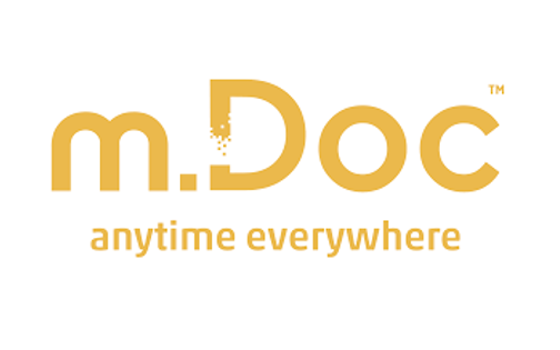 Holistic medical services at the "point of care" - anytime and anywhere! That is what the Cologne-based start-up m.Doc is promising to deliver, via software that enables the transfer of data from medical devices, wearables and classic apps to the m.Doc digital health platform. As of now, that also includes data from the Vscan Extend mobile ultrasound device made by GE Healthcare under a partnership arrangement. Vscan Extend is a dual-probe ultrasound system in smartphone format with wireless image data export functionality. The technology enables ultrasound scanning at the point of care, significantly improving patient care by allowing initial diagnosis.
Holistic medical services at the "point of care" - anytime and anywhere! That is what the Cologne-based start-up m.Doc is promising to deliver, via software that enables the transfer of data from medical devices, wearables and classic apps to the m.Doc digital health platform. As of now, that also includes data from the Vscan Extend mobile ultrasound device made by GE Healthcare under a partnership arrangement. Vscan Extend is a dual-probe ultrasound system in smartphone format with wireless image data export functionality. The technology enables ultrasound scanning at the point of care, significantly improving patient care by allowing initial diagnosis.
"We are extremely pleased to be partnering with GE Healthcare, as the Vscan Extend mobile ultrasound system ideally complements our telemedical platform and m.Doc service offerings. The platform is instrumental in keeping healthcare available despite declining numbers of physicians, particularly in rural areas. Those areas are very hard-hit now in terms of the supply of both general practitioners and specialists, and there could soon be a shortage of nursing personnel as well," reports Admir Kulin, CEO of m.Doc GmbH. It is currently projected that 50,000 practice-based physicians will retire by the year 2020. The KBV, Germany's National Association of Statutory Health Insurance Physicians, predicts that: "by 2030 there will be a shortage of over 6,000 physicians." “The use of mobile medical devices such as Vscan Extend via our mdoc platform can afford better emergency care and reduce emergency room admittances,” adds Kulin.
Telemedical solutions like those of m.Doc which utilise trained on-site personnel in remote communication with a physician, by video conferencing for example, can fill the anticipated healthcare gaps. With the m.Doc healthcare platform, a doctor is essentially always involved when needed. This is made possible by online access to the latest diagnostic findings, specially developed applications (like integrated vital sign monitoring) and video communication between patient, doctor and/or the assisting personnel, as well as connections to qualified partners. A mobile ultrasound system can deliver optimal support for such telemedical offerings, as Thomas Mehlich of GE Healthcare has pointed out: "Uncomplicated, fast and accurate... the Vscan Extend is extremely portable, allowing it to be used wherever needed, greatly facilitating life-saving decision-making in emergency situations. It can help the first examiner make the right diagnosis, reducing the amount of time before commencement of treatment."
The Vscan Extend can add value in other areas too. One can envision in the long term that the m.Doc mobile ultrasound system could become a useful addition to healthcare offerings in the mobility sector, where availability and cost are substantial problems. In industrial shipping for example, ship captains are sometimes forced to navigate off-course due to medical incidents, at considerable cost. Similarly, medical incidents requiring emergency landings and truck driver health problems cause tremendous costs for airlines and logistics providers every year - not to mention the considerably heightened risk involved for affected patients in such situations.
Used on board by a ship crew member for example, Vscan Extend can provide key additional information to a physician communicating by video-conferencing or other means to enable a more reliable diagnosis.
About m.Doc
'Connected Health' has become reality with the m.Doc mHealth platform. m.Doc can be deployed in a range of situations across economic sectors and segments, via established communication channels like video and messaging, via data sharing between medical devices, wearables and existing apps or via applications specially developed for easier physician use in a practice or hospital setting. The goal is for the focus to be on the patient, who is afforded the possibility of receiving physician care from any where and at all times - be it on the road, in an aeroplane or on a boat or train. m.Doc is also about connecting qualified partners with the solutions and systems that comprise a viable platform. Usability/user-friendliness for all parties and users is a top priority alongside quality, safety, data security and reliability.
m.Doc was founded in 2016 by an experienced group of entrepreneurs based in Cologne. The company's growth plans involve in part strategic partnerships with such prominent corporations as GE Healthcare and Telekom.